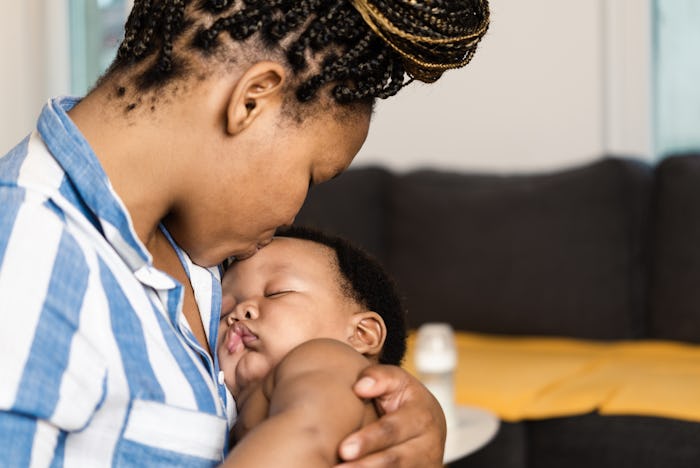Baby

Experts Explain Whether It’s Safe For Your Baby To Sleep On Your Chest
It depends on whether you’re sleeping, too.
When it comes to pregnancy and babies, there are lots of things to be fearful of — and not just being a new parent yourself, but being around anyone who is pregnant. Though I know a baby is safe in their parent's womb, I've always worried that the slightest touch would cause them to be harmed. Similarly, I've grown somewhat fearful of newborn babies, simply because there are so many things that can happen to them, too — especially while they're sleeping. With co-sleeping becoming more popular among parents, one of the main questions I (and many others) have is this one: Can babies sleep on their stomach on your chest? Or is it unsafe? Here’s what experts want you to know.
Is it safe for baby to sleep on your chest?
The rule of thumb is: It’s safe if you’re awake. "It's OK to let a newborn baby sleep on your chest as long as you don't fall asleep, too," Jean Moorjani, M.D., a pediatrician at Orlando Health Arnold Palmer Hospital for Children, tells Romper. "If you're awake, it's perfectly fine to watch them snooze on your chest. If you feel sleepy, then put your baby in their crib or bassinet."
It's when you fall asleep that having your little one snoozing on your chest gets dangerous. “Sudden Infant Death Syndrome (SIDS) is, of course, the concern,” Arunima Agarwal, M.D., a New York-based board-certified pediatrician, tells Romper. SIDS refers to the sudden, unexplained death of an infant during sleep. In the case of a baby on a parent’s chest while that parent is asleep, they may potentially roll onto the baby, causing SIDS, suffocation, or strangulation.
According to statistics from the Centers for Disease Control and Prevention (CDC), 3,500 babies die of sleep-related causes in the United States each year, with SIDS among the leading causes. For that reason, the American Academy of Pediatrics (AAP) does not recommend bed sharing under any circumstances, though they acknowledge some parents still choose to do it.
However, in this specific scenario, the solution is simple and straightforward: “As long as the parent, guardian, or adult is awake, it's perfectly fine,” Agarwal says.
Why do babies like to sleep on your chest?
There are a few reasons why it feels incredibly natural to have your baby sleep on your chest — and why they like it so much. For one, sleeping on an awake parent's chest can help babies to feel calmer. “It’s very intuitive and comforting, body contact,” Agarwal says. “Skin-to-skin contact increases body heat, and baby feels safe, comforted, and warm. Especially when the baby's younger, you swaddled them up to a certain point, so this is almost like a like a natural swaddle, because they feel warm and safe.”
Yet another reason why babies might like to sleep on your chest: the sound of your heartbeat. "It reproduces the in utero environment where mom’s pulse was the primary and constant sound the baby heard," Nicole Porter, Ph.D., a sleep and fatigue specialist, previously told Romper. "It's familiar and comforting."
Benefits of baby sleeping on your chest
The comfort level of your little one is a huge plus. Any new parent can attest that there are times they would do just about anything to get their baby to sleep soundly. “It’s huge for a newborn to feel comforted and safe, because they'll stay asleep longer,” Agarwal says. “In that position, they’re hearing your breathing and heartbeat — all of these things are reminiscent of being in the womb and, again, just provide more comfort to the infant.”
Plus, the more time you can spend holding and cuddling your baby (when you're awake), the better. “It's also bonding for the parents, not just for the baby,” says Agarwal. “For the adult this position creates bonding, which improves the relationship overall, because most parents and adults are sleep deprived those first few months. Bonding is extremely important for the adult to the baby, and the other way around, as well.”
Although letting your baby sleep on your chest does have some perks, parents should take the advice of medical experts and be incredibly diligent about not nodding off along with their baby. If you do place your baby on your chest to get them to fall asleep, be sure to transport them off to their crib and place them on their back before you drift off, too.
Experts:
Jean Moorjani, M.D., pediatrician at Orlando Health Arnold Palmer Hospital for Children
Arunima Agarwal, M.D., New York-based board-certified pediatrician
Nicole Porter, Ph.D., sleep and fatigue specialist
This article was originally published on